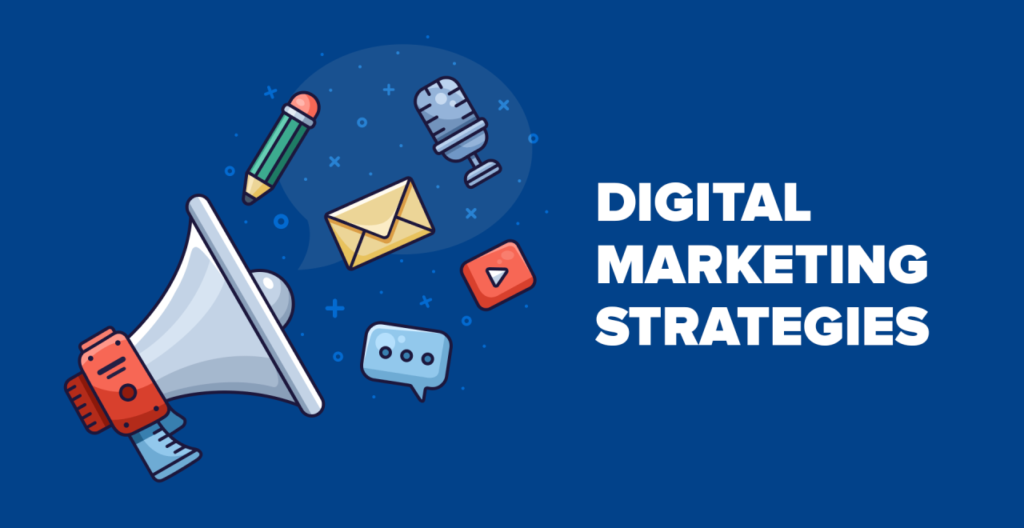Developing a digital marketing strategy is crucial for any business aiming to succeed in today’s competitive environment. Here’s a comprehensive guide to creating a winning digital marketing plan customized to your business objectives.

1. Define Your Objectives and Goals
Begin by clearly defining the goals you want to accomplish with your digital marketing efforts. Whether it’s increasing brand awareness, driving traffic, generating leads, or boosting sales, clear objectives will guide your strategy.
2. Understand Your Target Audience in Digital Marketing
Conduct thorough research to define your target audience. Create buyer personas that represent your ideal customers, considering factors like demographics, interests, pain points, and buying behaviors. Understanding your audience allows you to create messages that truly connect with them.
3. Analyze Your Competitors in Digital Marketing
Analyze your competitors’ activities in the digital space. Identify their strengths, weaknesses, and gaps you can exploit. Tools like SEMrush or Ahrefs can provide insights into your competitors’ SEO, content, and paid strategies.
4. Choose the Right Channels
Based on your goals and audience, determine which digital channels are best for your strategy. Some key channels include:
- SEO: For organic traffic and visibility.
- Content Marketing: Blogs, videos, infographics to engage your audience.
- Social Media: Platforms like Instagram, LinkedIn, or Twitter for community building and brand engagement.
- Email Marketing: For nurturing leads and retaining customers.
- PPC Advertising: Paid campaigns on Google Ads or social platforms to drive immediate traffic and conversions.
5. Develop a Content Strategy
Content is the foundation of digital marketing. Plan out the type of content that aligns with your audience’s needs and your business goals. This could include blog posts, videos, podcasts, case studies, or infographics. Make sure your content is valuable, relevant, and optimized for search engines (SEO).
6. Set a Budget and Allocate Resources
Decide how much you are prepared to invest in your digital marketing activities. Allocate resources to different channels based on their ROI and importance to your goals. Ensure your team has the right tools, skills, and technologies to execute the strategy effectively.
7. Implement and Optimize SEO
A strong SEO strategy is crucial for long-term growth. Focus on:
- Keyword Research: Identify relevant search terms.
- On-Page SEO: Enhance your website’s content, meta tags, and images for better optimization.
- Technical SEO: Enhance site speed, ensure mobile-friendliness, and refine navigation.
- Link Building: Acquire quality backlinks to enhance domain authority.
8. Leverage Data and Analytics
Use tools like Google Analytics, SEMrush, or HubSpot to track performance metrics. Track essential metrics such as traffic, conversions, bounce rates, and customer acquisition costs. Regularly analyze the data to understand what’s working and where adjustments are needed.
9. Focus on Conversion Rate Optimization (CRO)
It’s not just about driving traffic; converting visitors into customers is equally important. Optimize landing pages, call-to-actions (CTAs), and user experience (UX) design to improve conversion rates.
10. Test, Measure, and Adapt
Digital marketing is dynamic, so continuous testing and refinement are essential. Run A/B tests, tweak campaigns, and adjust your strategy based on data insights. Keep up with industry trends and be prepared to adapt when necessary.
11. Build a Strong Brand Presence on Digital Platform
Consistency in branding across all digital platforms is key to building trust. Ensure that your brand voice, visual identity, and messaging are consistent across your website, social media, email, and ads.
12. Engage and Nurture Your Audience
Engage with your audience through regular communication. Respond to comments, run polls or Q&A sessions, and use personalized email campaigns to nurture leads. Building relationships with your audience fosters loyalty and encourages repeat business.
Conclusion
A successful digital marketing strategy requires careful planning, ongoing analysis, and adaptability. By setting clear goals, understanding your audience, and leveraging the right channels, your business can thrive in the digital space. Keep testing, learning, and optimizing to stay ahead of the competition and achieve sustained growth.


Leave a Reply